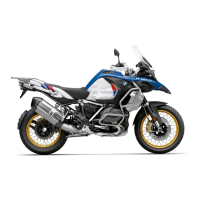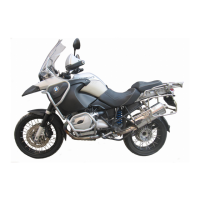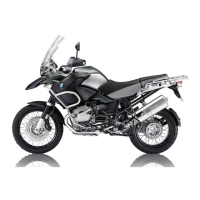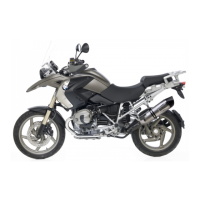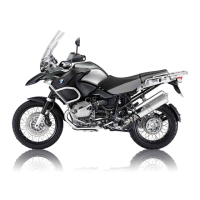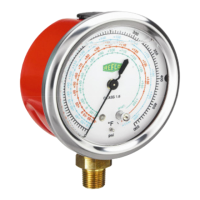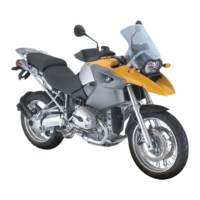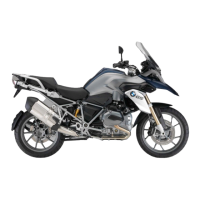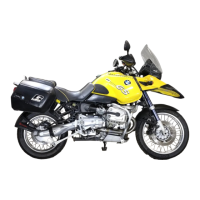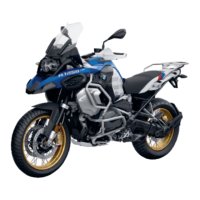
Do you have a question about the BMW R 1250 GS Adventure and is the answer not in the manual?
| Displacement | 1254 cc |
|---|---|
| Final Drive | Shaft drive |
| Tire Front | 120/70 R19 |
| Tire Rear | 170/60 R17 |
| Fuel Type | Premium unleaded |
| Engine Type | Air/liquid-cooled four-stroke flat twin engine, double overhead camshaft, one balance shaft |
| Max Power | 100 kW (136 hp) at 7, 750 rpm |
| Max Torque | 143 Nm at 6, 250 rpm |
| Transmission | 6-speed |
| Frame | Two-section frame, front and bolted on rear frame |
| Front Suspension | BMW Motorrad Telelever |
| Rear Suspension | BMW Motorrad Paralever |
| Front Brakes | Dual disc brakes, diameter 305 mm, 4-piston radial calipers |
| Rear Brakes | 276 mm disc, 2-piston caliper |
| Fuel Capacity | 30 liters |
| Curb Weight | 268 kg |
| Fuel Consumption | 4.75 l/100 km |
| Available Colors | Ice Grey |
Guide to quickly find information in the rider's manual.
Explanation of abbreviations and symbols used throughout the manual.
Description of optional equipment and accessories provided by BMW.
Details on dimensions, weights, and power ratings according to DIN standards.
Information on control units and data processing in the vehicle.
Explanation of the eCall system for automatic or manual emergency calls.
Details about Bluetooth technology and potential interference sources.
Overview of media, telephony, and navigation functions via mobile device.
Diagram and identification of components on the left side of the motorcycle.
Diagram and identification of components on the right side of the motorcycle.
Identification of components located underneath the rider's seat.
Identification and function of controls on the left handlebar switch.
Identification and function of controls on the right handlebar switch.
Overview and identification of elements on the instrument cluster display.
Explanation of various indicator and warning lights on the instrument cluster.
Description of the instrument cluster menu structure and navigation.
Details on the Pure Ride view and its start screen layout.
Overview of the 'My Vehicle' screen and its data presentation.
Detailed explanation of warning indicators and their meanings.
Safety warnings related to smartphone use and distractions while riding.
Identification and function of the Multi-Controller and MENU rocker button.
How to call up and reset the on-board computer and 'My Vehicle' menu.
Instructions on calling up and resetting trip computer menus.
Guidance on adjusting volume, system settings, and display brightness.
Procedure for pairing and connecting Bluetooth devices like phones and helmets.
How to toggle between Navigator and instrument cluster operation.
Steps for entering destinations and starting route guidance.
Instructions for controlling music playback via the handlebar controls.
How to manage telephone calls, including accepting, rejecting, and ending calls.
Instructions to check the software version of the instrument cluster display.
Information on accessing licence details within the system.
Operation of the ignition switch, steering lock, and key functions.
Instructions for operating the ignition system using the radio-operated key.
Information on the function and operation of the kill switch.
Details on making emergency calls via BMW and manual emergency call procedures.
Procedures for operating headlights, sidelights, and parking lights.
How to switch DTC on and off, and manage its settings.
Explanation of Dynamic ESA for automatic suspension adjustment to load.
Guide to selecting and using different riding modes for various conditions.
Details on preselecting and setting up Pro riding modes.
Instructions for switching cruise control on/off and setting road speed.
Information on activating and operating Hill Start Control and HSC Pro.
Steps for activating and customizing the anti-theft alarm system.
Instructions for switching tyre pressure warnings on or off.
How to operate heated handlebar grips and passenger seat heating.
Instructions for opening and closing the storage compartment.
Procedure for adjusting mirrors and mirror arms.
Adjusting headlight beam throw and spring preload.
Instructions for adjusting the windscreen height while riding.
Procedure for adjusting the clutch lever span.
Instructions for adjusting the handbrake lever and footbrake lever.
Steps for adjusting the gearshift lever and its peg.
Procedure for adjusting footrests and their clamping blocks.
Information on adjustable handlebars and installing handlebar risers.
Instructions for removing and installing passenger and rider seats.
Procedure for removing and installing the rallye seat.
Essential steps for setting rear suspension spring preload to suit load.
How to adjust damping for rear wheel and suspension settings.
Guidance on rider's equipment and safety considerations.
Checklist for regular maintenance and pre-ride inspections.
Instructions on how to start the engine and troubleshooting starting issues.
Guidance for the engine's running-in period and new brake pads/tyres.
Specific considerations for off-road riding, including tyre pressure and brakes.
Explanation of the gear shift assistant and how to shift gears.
Information on minimizing stopping distance and emergency braking procedures.
Proper procedures for parking the motorcycle on side or centre stands.
Guidance on recommended fuel grades and refuelling procedures.
Instructions on how to securely transport the motorcycle.
General information about motorcycle engineering, visit bmw-motorrad.com/technik.
Explanation of how ABS works, surface irregularities, and rider feedback.
How traction control works and its operation in different riding modes.
Purpose and operation of dynamic engine brake control to prevent unstable states.
Electronic chassis and suspension adjustment for automatic load adaptation.
Selection of riding modes (ECO, RAIN, ROAD) and their influence on systems.
How Dynamic Brake Control works and its behavior in emergency braking.
Functionality of the tyre pressure monitoring system.
Explanation of the Gear Shift Assistant Pro system and its advantages.
Functionality of Hill Start Control as a pullaway assistant on gradients.
Functional principle of ShiftCam technology for varying valve timing.
How the adaptive cornering headlight works to improve visibility in corners.
General maintenance procedures, tightening torques, and special tools.
Contents of the on-board toolkit and their uses.
Instructions for installing and using the front-wheel stand safely.
Procedure for checking and topping up engine oil.
Checking brake operation, pad thickness, and fluid levels.
Checking the operation and pressure point of the clutch lever.
Procedure for checking and topping up the coolant level.
Instructions for checking tyre pressures and tread depth.
Procedure for checking wheel rims and spokes for defects.
Effect of wheel size on chassis and suspension control systems.
Instructions for removing, checking, and installing the air filter element.
Procedures for replacing headlight and side light bulbs.
Safety precautions and steps for jump-starting the motorcycle.
Maintenance instructions for the battery, including charging and replacement.
Procedure for replacing fuses and information on fuse allocation.
Instructions for disengaging and securing the diagnostic socket.
Caution regarding use of non-BMW products and legal compliance.
Information on connecting electrical devices to the motorcycle's power sockets.
Notes on using the USB charging socket, including charge current and shutdown.
Instructions for opening, closing, and removing/installing luggage cases.
Procedures for opening, closing, and removing/installing the topcase.
Instructions for securing the navigation device and operating the system.
Recommendations for using BMW Care Products for cleaning and protection.
Warning and advice on washing the vehicle, especially after rain or washing.
Guidelines for cleaning plastics, instrument clusters, chrome, and rubber parts.
Tips for maintaining paintwork, removing stains, and preserving the finish.
When and how to preserve the paintwork using recommended products.
Steps for preparing the motorcycle for storage.
Procedure for bringing the motorcycle back into service after storage.
Guide to diagnosing and rectifying common engine starting problems.
Table of tightening torques for front and rear wheel fasteners.
Information on recommended and alternative fuel grades and capacities.
Specifications for engine oil capacity, type, and topping up.
Details on engine number location, type, design, displacement, and capacity.
Technical specification for the clutch type.
Technical specification for the transmission type.
Technical data for the final drive gear ratio and oil.
Location of the type plate and vehicle identification number.
Specifications for front and rear suspension types and travel.
Technical data for front and rear brake systems, including pad material and disc thickness.
Specifications for tyre speed category, rim size, designation, and pressure.
Details on electrical system ratings, fuses, battery, spark plugs, and lighting.
Specifications for the motorcycle's length, height, width, and seat height.
Vehicle kerb weight, permissible gross vehicle weight, and maximum payload.
Data on top speed with different configurations.
Procedure for reporting safety defects to authorities like NHTSA.
Information on the proper disposal of the rider's manual.
Information about the BMW Motorrad service network and maintenance compliance.
Explanation of service entries and electronic service booklets.
Overview of mobility services available to BMW vehicle owners.
Details on pre-delivery checks, running-in checks, and service schedules.
Schedule of required maintenance tasks based on mileage or time intervals.
Tasks included in the BMW Motorrad running-in check.
List of tasks included in the standard BMW Motorrad Service scope.
Table for recording maintenance and repair work performed.
EU and UK declarations of conformity for radio equipment components.
Technical information for the EWS 4 electronic immobiliser.
Technical information for the Keyless Ride Key HUF5794.
Technical information for the Keyless Ride ECU HUF8485.
Certification details for Tire Pressure Control systems.
Technical information for the TFT instrument cluster radio equipment.
Alphabetical index of topics covered in the manual.
